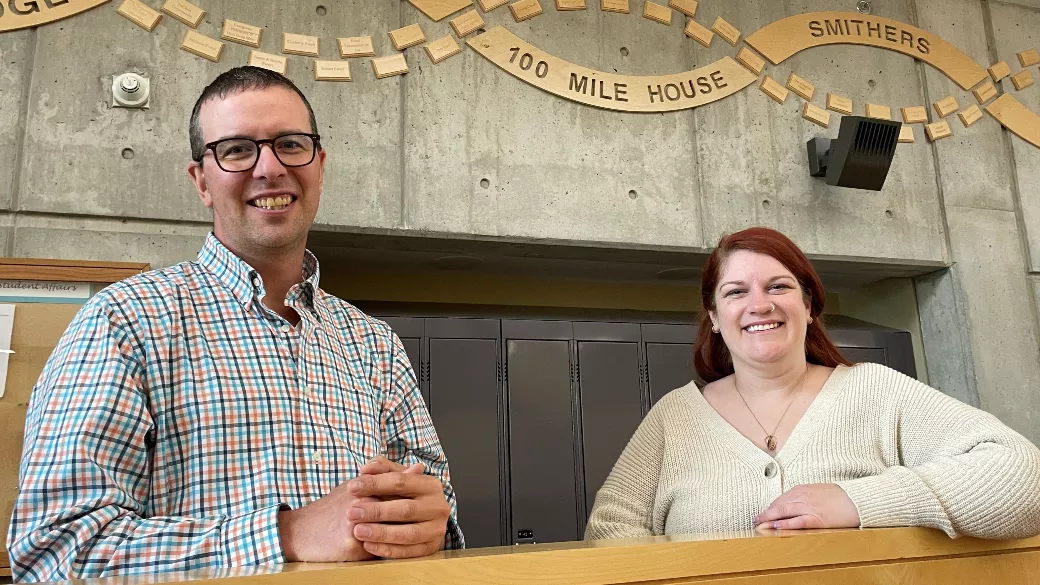Student Research: Examining challenges to blood donation in rural Canada

Over the summer, Crystal McLeod, a student in the NMP's Class of 2026, pursued a research project focused on understanding the loss of blood donation services in northern B.C. and other rural regions in Canada, which included two arms: a discourse analysis of mainstream media and a mixed-methods study.
What prompted you to become part of this research project?
Before beginning my studies at the NMP and moving to Prince George, I was a lifelong Otario resident. As Ontario is a more populated province, the region is rich with opportunities to donate blood. As such, I started donating blood when I was 18 at mobile clinics that came to my rural hometown and continued to donate throughout adulthood at both larger city centres with standing clinics and mobile clinics (I have successfully donated a total of 15 times in my life).
Upon moving to Prince George, I went to the Canadian Blood Services website and typed in my new location to find a place to donate. I was shocked to see that the closest donation centre was over 600 kilometers away, and there was no access to a donation centre for residents of northern B.C. A quick Google search revealed to me that the region did have a permanent donation clinic, which closed in 2015, with financial losses cited for the closure. Disappointed that I would no longer be able to donate in my new home, I expressed my frustration to several NMP faculty members and had discussed the topic with Dr. Sean Maurice several times over the course of my first year. Towards the end of my first year, I learned about the UBC Faculty of Medicine Summer Student Research Program (SSRP). I thought this program may be a great way for Dr. Maurice and I to take a point of shared interest to an academic forum.
Can you briefly explain your research?
A quick look of the academic literature reveals there has been previous studies of rural and remote blood donation programs, but primarily in the context of developing nations and blood borne disease. Likewise, previous media discourse analysis on the topic of blood donation has been conducted chiefly in the realm of social media to gauge individual donor motivations.
This project’s purpose was to understand what the current media representations of blood donation in rural and remote Canada are. A special focus was given towards examining the service-related challenges to blood donation in these regions of Canada. To complete this study, I spent much time this summer searching new media sites and reading articles to determine if they can be included for analysis. Once included, the articles are analyzed by myself and another researcher for common ideas, sayings, and themes.
Although our results are pending, we hope to share findings at a local conference this fall and in a publication further in the future.
Who did you work with on this project?
My primary supervisor for this project is Dr. Sean Maurice. However, I do have additional support from Dr. J. Kornelsen who is faculty at the University of British Columbia, and another medical student, Saghi Nayer-Nouri, is helping to verify my results.
How did this project help further your learning as a medical student?
I think anytime a medical student engages in research it can be very meaningful. Regardless of the topic, methodology or outcomes of the research, getting experience matching clinical practice and academic investigation is a helpful tool for any future physician to have (especially when a challenging problem arises! Or system change is desired). I am grateful UBC requires medical students to conduct research in a designated FLEX block, and also provide opportunities for summer research via SSRP (which funded this summer research).
As well, I have a masters degree in nursing. I thought this project was especially helpful to furthering my knowledge of the research method of discourse analysis. I completed my first discourse analysis during my graduate studies, which I used to examine media sources for themes and narratives that shape public opinion. Conducting a media discourse analysis over this summer reinforced my previous learning and allowed me to grow in how I use this research technique.